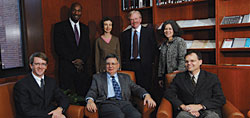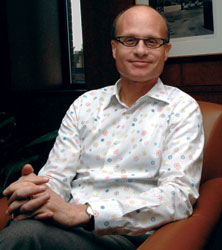Today’s Leaders
GW Law Announces New Endowed
Chairs and Research Professorships
By Dan Williams

GW Law is pleased to announce the appointment
of eight faculty members to endowed chairs
and research professorships. From left
to right (seated): John Duffy, Lewis Solomon,
and Robert Tuttle. From left to right
(standing): Paul Butler, Naomi Cahn, Roger
Trangsrud, and Theresa Gabaldon. (Lawrence
Mitchell is pictured below.)
Claire Duggan
|

|
The strength of a great law school is built
upon its faculty; this fall, GW Law shows its
strength through the appointment of eight professors
to endowed chairs and research professorships.
While their backgrounds are varied, these professors—Paul
Butler, Naomi Cahn, John Duffy, Theresa Gabaldon,
Lawrence Mitchell, Lewis Solomon, Roger Trangsrud,
and Robert Tuttle—all display a high level
of expertise in their research and teachings.
These appointments are made possible through
the support of alumni and friends.
“It is always a great pleasure to acknowledge
both excellence in our faculty and the generosity
of our benefactors,” says Dean Frederick
M. Lawrence. “Each of these individuals
is deserving of recognition for outstanding
contributions to scholarship, and I am certain
each will bring honor to those for whom the
positions are named.”
Paul Butler
Carville Dickinson Benson Research Professor
of Law
Many students and media outlets
seek out the perspective of Paul Butler on race
relations and criminal law, as he consistently
demonstrates a fresh and poignant take on the
topics.
Butler, the Carville Dickinson Benson Research
Professor of Law, appears on programs including
CNBC’s The News with Brian Williams
and C-SPAN’s Washington Journal.
He writes op-ed pieces for the Los Angeles
Times and The Washington Post.
He also is praised for his lectures, including
“A Hip-Hop Theory of Justice,” which
analyzes criminal justice themes in contemporary
music.
Butler says his previous work as a prosecutor
for the Department of Justice, where his focus
was public corruption, in part motivated him
to concentrate on race relations in academia.
“Every African-American man must have
some interest in race relations, and criminal
law as a survival skill,” Butler says.
“My theoretical interest in the subjects
coincides with my experience as a former prosecutor
and my life as a black male in the United States.”
Butler was awarded the Distinguished Faculty
Service Award three times by GW Law graduating
classes. He also has been awarded the Soros
Justice Fellowship for 2006-07. He is writing
a book tentatively titled Ain’t Gonna
Take It No More: How Angry Black Men Are Changing
America, which he describes as a work that
“looks at the strong influence blacks
have on popular culture, and how this is affecting
law, policy, and social norms.”
Naomi Cahn
John Theodore Fey Research Professor of
Law
The efforts of Naomi R. Cahn emphasize the
compassionate aspects of law, notably research
she conducted in Kinshasa, the capital of the
Democratic Republic of the Congo. From 2002
to 2004, Cahn spent time in the former Zaire,
as it recovers from years of civil war. She
studied post-conflict legal issues and women’s
and children’s rights.
“It’s in the midst of a big transition
to democracy. There were a lot of innovative
ideas on how to go about reconstructing a country
that is recovering from devastating war,”
Cahn says.
The John Theodore Fey Research Professor of
Law, Cahn is a nationally recognized expert
in the fields of family law, domestic violence,
and professional responsibility. In recent years,
she has published “Battered Women, Child
Maltreatment, Prison and Poverty: Issues for
Theory and Practice” as part of the American
University Journal of Gender, Social Policy
& the Law symposium issue on domestic
violence (2003) and “Parenthood, Genes,
and Gametes: The Family Law and Trusts and Estates
Perspectives” as part of a symposium in
32 University of Memphis Law Review
563 (2002).
In 1993, Cahn came to GW Law after five years
as the assistant director of the Sex Discrimination
Clinic at Georgetown University Law Center.
She also serves as associate dean for faculty
development.
John F. Duffy
Oswald Symister Colclough Research Professor
of Law
Once a physics major during his undergraduate
days at Harvard, John Duffy now is a nationally
recognized specialist in intellectual property
and administrative law, as well as the co-author
of the leading casebook on patent law.
After graduating from the University of Chicago
Law School, Duffy, the Oswald Symister Colclough
Research Professor of Law, clerked for Judge
Stephen Williams of the U.S. Court of Appeals
for the D.C. Circuit and for Justice Antonin
Scalia of the U.S. Supreme Court. He also served
as an attorney-adviser in the Department of
Justice’s Office of Legal Counsel and
practiced law with the Washington firm Covington
& Burling.
Since entering academia in 1996, Duffy has
been on the faculty of the Benjamin N. Cardozo
School of Law and the William and Mary School
of Law, and also has served as a visiting professor
at the University of Chicago. Duffy has published
articles in the University of Chicago Law
Review, Columbia Law Review, Texas Law Review,
and Supreme Court Law Review.
Theresa A. Gabaldon
Lyle T. Alverson Professor of Law
There was a time when Theresa Gabaldon thought
she would become a tax attorney; instead, she
is a pioneer in securities law, approaching
the discipline with a feminist view. Gabaldon
says this perspective has allowed her to “create
my own niche.”
Gabaldon, the Lyle T. Alverson Professor of
Law, contends that the theory behind corporate
law was primarily set forth by empowered white
men, and that it doesn’t necessarily reflect
the value system of many women. She says a class
her husband taught inspired her to look at corporate
law from a feminist angle.
Gabaldon joined the GW Law faculty in 1990.
She has served as a member of a number of committees
and task forces, including the Colorado Supreme
Court’s Task Force on Gender Bias and
the committee responsible for drafting the Association
of American Law Schools’ Statement of
Good Practices by Law Professors in the Discharge
of Their Ethical and Professional Responsibilities.
She also is the author of a leading casebook
in securities law, and she is widely published
in the areas of securities law and professional
responsibility.
Lawrence E.
Mitchell
Theodore Rinehart Professor of Business
Law

|

Lawrence Mitchell
Claire Duggan
|
For 15 years, Lawrence Mitchell has reminded
GW Law students that, even in the corporate
world, one has an ethical duty to “look
out for the little guy.” Mitchell, the
Theodore Rinehart Professor of Business Law,
is a leader in the field of progressive corporate
law. He champions the use of economic sociology
to address corporate-law issues.
“I think we ought to create legal institutions
that protect the most vulnerable amongst us,”
Mitchell says. “Many lawyers view corporate
law as a very financial and technical field,
but it’s also an association of human
being within a framework, and it naturally has
vulnerabilities.”
Mitchell’s book Stacked Deck: A Story
of Selfishness in American (Temple University
Press, 1998) was submitted for the Pulitzer
Prize in general non-fiction. In 2002, he penned
Corporate Irresponsibility: America’s
Newest Export, which also was submitted
by the publisher for a Pulitzer Prize. Mitchell
serves as director of the Sloan Program for
the Study of Business in Society and the International
Institute for Corporate Governance and Accountability.
Mitchell says his Jewish faith is a contributing
factor to the way he teaches and practices law,
with an emphasis on empathy and responsibility.
Lewis Solomon
William Van Vleck Research Professor of
Law
Lewis Solomon’s expertise in corporate
and securities law, taxation, business and estate
planning, and policymaking has earned him several
named appointments at respected universities.
He has served as the inaugural Arthur Young
Visiting Professor of Tax Law at Monash University
in Australia; the inaugural Rupert and Lillian
Redford Visiting Professor of Law at Southern
Methodist University; the Frances Lewis Scholar-in-Residence
at Washington and Lee Law School; and the Heyman
Center Scholar-in-Residence at Cardozo Law School.
At GW Law, he serves as the William Van Vleck
Research Professor of Law.
Prior to joining the Law School faculty in
1977, Solomon clerked for a federal district
court judge in Wilmington, Del.; practiced law
in New York; and taught law at the University
of Missouri. Known for his ability to connect
with students, Solomon also has taught at the
law schools of the University of Sydney, Australian
National University, University of Miami, and
Florida State University.
Roger H. Trangsrud
James F. Humphreys Chair in Complex Litigation
and Civil Procedure
Roger H. Trangsrud is a respected member of
the faculty whose leadership as interim dean
between the administrations of Michael K. Young
and Frederick M. Lawrence leaves a lasting impression
on GW Law today. Trangsrud has been with the
Law School since 1982, and has been the faculty
expert on complex litigation ever since. His
interest in large class-action lawsuits stems
from working as a litigator for the Washington
firm Hogan & Hartson.
Trangsrud enjoys these cases because of their
intricacies. “It’s not obvious how
to handle them,” Trangsrud says. “These
are difficult cases for the courts to manage
fairly and efficiently, and that makes them
of interest to me. When I first started teaching
the class on complex litigation, the kinds of
cases that our students were working on were
increasingly cases of that type.”
Trangsrud is the inaugural appointee to the
James F. Humphreys Chair in Complex Litigation
and Civil Procedure. He says it was an honor
to receive the honor in the name of GW Board
of Trustees charter member James F. Humphreys,
JD ’78, a member of the GW Board of Trustees.
As a scholar in his field, Trangsrud co-authored
the casebook Complex Litigation and the
Adversary System and also wrote the treatise
Complex Litigation: Problems in Advanced
Civil Procedure. In addition to his time
as interim dean, Trangsrud served as senior
associate dean for academic affairs for 13 years.
Robert Tuttle
David R. and Sherry Kirschner Berz Research
Professor of Law and Religion
After graduating from GW Law in 1991, Robert
Tuttle earned a PhD in religious ethics from
the University of Virginia; he also holds a
master’s degree from the Lutheran School
of Theology at Chicago. His education as well
as his widespread scholarship and consulting
work related to religion and law have made him
a respected leader in the field.
The David R. and Sherry Kirschner Berz Research
Professor of Law and Religion, Tuttle joined
the GW Law faculty in 1994. His specialties
include legal ethics, constitutional law and
religion, and moral philosophy.
Tuttle is the author of Love Thy Neighbor:
Churches and Land Use Law. He also is the
co-editor of Citizens in Two Cities: New
Lutheran Perspectives on Church and State.
With professor Ira C. Lupu, he is the co-author
of numerous articles and reports on government
aid for and control of religious institutions.
He and Lupu serve as co-directors of the Legal
Tracking Project of the Roundtable on Religion
and Social Welfare Policy, which is funded by
a grant from the Pew Charitable Trust.
Tuttle also serves as legal counsel to the
Lutheran bishop of Washington and has been a
board member and consultant for the Division
for Church in Society of the Evangelical Lutheran
Church in America.